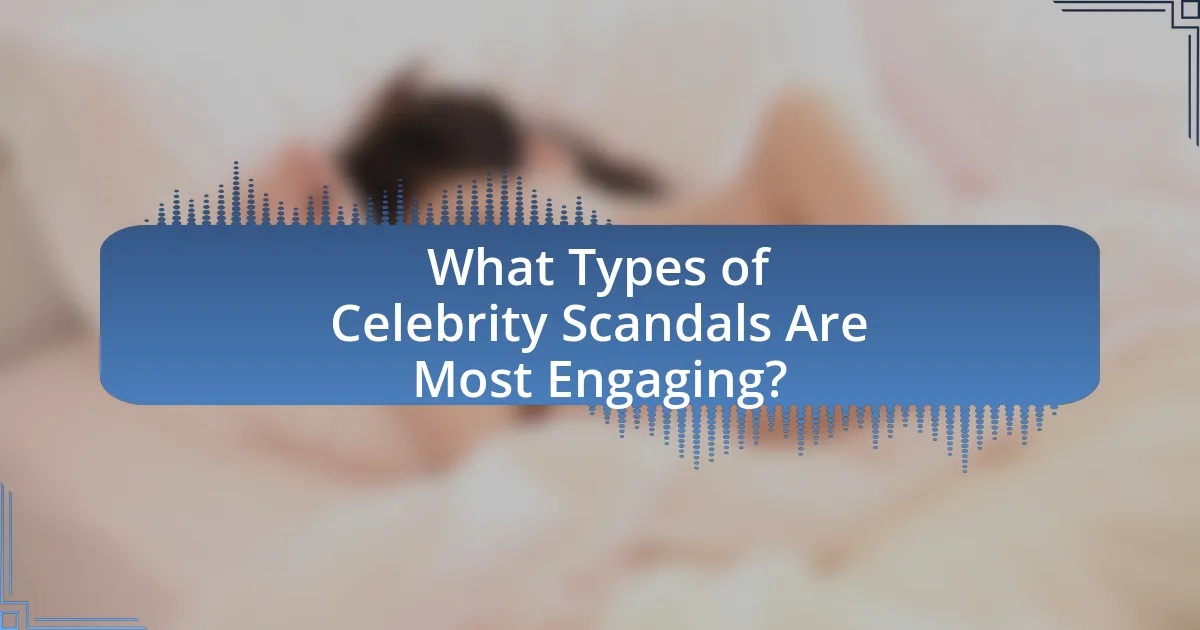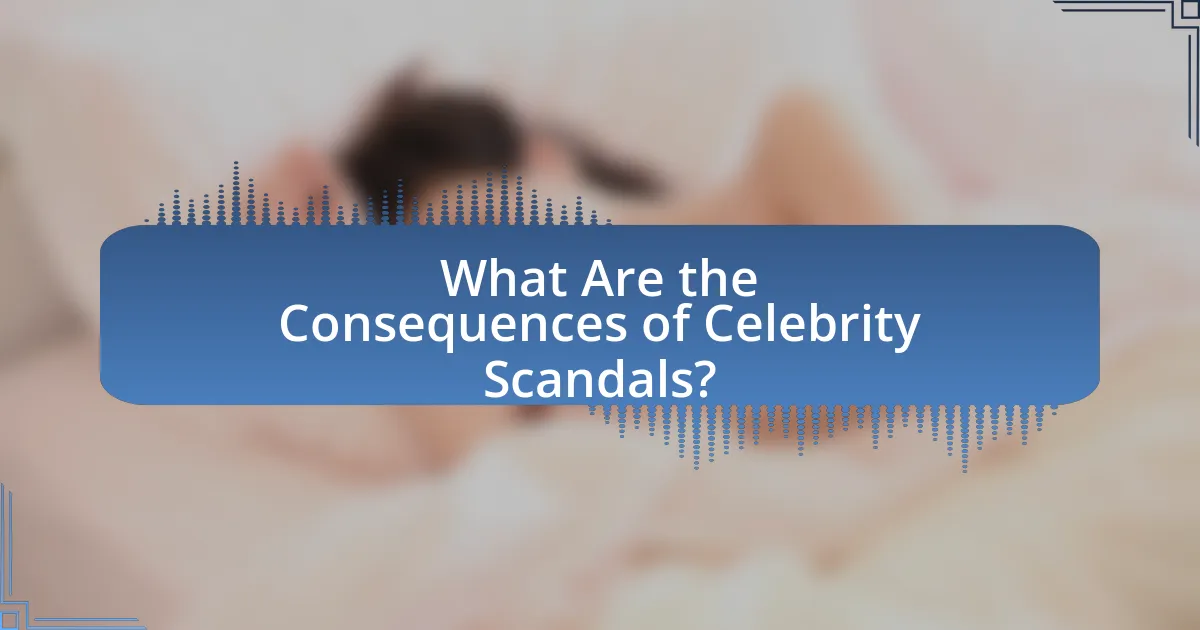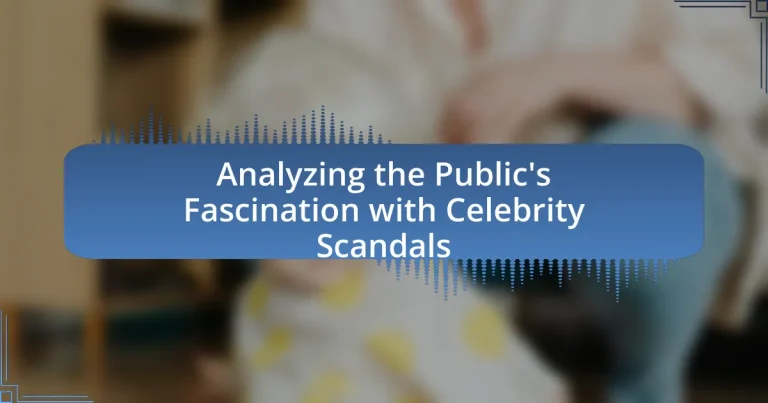The article analyzes the public’s fascination with celebrity scandals, highlighting the psychological factors, social dynamics, and media influence that drive this interest. It discusses how elements such as social comparison, voyeurism, and the need for entertainment contribute to the allure of scandals, while media coverage and social media amplify public engagement. The article also examines the implications of these scandals on celebrity reputations, societal values, and public discourse, as well as strategies celebrities can employ to manage their public image during controversies. Key categories of scandals, demographic reactions, and the broader societal lessons learned from these events are also explored.
What Drives the Public’s Fascination with Celebrity Scandals?
The public’s fascination with celebrity scandals is primarily driven by a combination of psychological factors, social dynamics, and media influence. People are inherently drawn to drama and conflict, which celebrity scandals provide in abundance, fulfilling a psychological need for entertainment and escapism. Additionally, social comparison theory suggests that individuals often evaluate their own lives against the perceived glamour and misfortunes of celebrities, creating a sense of connection or superiority. Media outlets amplify this fascination by sensationalizing scandals, ensuring constant coverage that keeps the public engaged. Research indicates that approximately 70% of people follow celebrity news, highlighting the significant interest in their lives and controversies.
Why are Celebrity Scandals Captivating to Audiences?
Celebrity scandals are captivating to audiences because they evoke strong emotional reactions and provide a sense of drama that is often absent in everyday life. The allure stems from the combination of fame, fortune, and the fallibility of public figures, which creates a narrative that is both relatable and sensational. Research indicates that people are drawn to stories that involve conflict and moral dilemmas, as these elements resonate with their own experiences and values. For instance, a study published in the Journal of Communication found that audiences are more likely to engage with content that features scandalous behavior, as it satisfies their curiosity and desire for entertainment. This fascination is further amplified by social media, where real-time updates and public discourse allow audiences to participate in the unfolding drama, reinforcing their interest and investment in the outcomes of these scandals.
What psychological factors contribute to this fascination?
The psychological factors contributing to the public’s fascination with celebrity scandals include social comparison, voyeurism, and the need for entertainment. Social comparison theory suggests that individuals evaluate their own worth by comparing themselves to others, often leading to increased interest in the lives of celebrities. Voyeurism, the desire to observe others’ private lives, drives people to engage with scandalous content as it provides a sense of thrill and excitement. Additionally, the entertainment value of scandals satisfies the human need for narrative and drama, making them appealing. Research indicates that these factors are rooted in human psychology, as they fulfill emotional and cognitive needs, thereby reinforcing the public’s ongoing interest in celebrity scandals.
How does media coverage amplify public interest?
Media coverage amplifies public interest by increasing visibility and accessibility of information regarding events or individuals, particularly in the context of celebrity scandals. When media outlets extensively report on a scandal, they create a narrative that captures audience attention, often leading to heightened emotional engagement. For instance, a study by the Pew Research Center found that 63% of Americans follow celebrity news closely, indicating that media coverage significantly influences public curiosity and engagement. This phenomenon is further supported by the fact that sensationalized reporting can lead to viral discussions on social media platforms, further driving public interest and participation in the conversation surrounding the scandal.
What Role Does Social Media Play in Celebrity Scandals?
Social media serves as a catalyst in celebrity scandals by amplifying information dissemination and public engagement. Platforms like Twitter and Instagram enable rapid sharing of news, rumors, and personal opinions, often leading to viral discussions that can escalate situations quickly. For instance, the 2014 incident involving celebrity photo leaks demonstrated how social media facilitated the spread of private images, resulting in widespread outrage and significant media coverage. This immediacy and reach of social media not only shape public perception but also influence the responses of celebrities and their management teams, making it a pivotal element in the dynamics of celebrity scandals.
How do platforms like Twitter and Instagram influence public perception?
Platforms like Twitter and Instagram significantly influence public perception by shaping narratives and amplifying voices. These social media platforms enable rapid dissemination of information, allowing users to share opinions, reactions, and content related to celebrity scandals almost instantaneously. For example, a study by the Pew Research Center found that 69% of adults in the U.S. use social media, which often serves as a primary source of news and information, particularly about celebrities. This widespread usage means that trending topics can quickly sway public opinion, as users engage with and react to posts, creating a feedback loop that can either bolster or damage a celebrity’s reputation. Additionally, algorithms on these platforms prioritize content that generates high engagement, further amplifying sensational stories and shaping the public’s perception of events and individuals involved in scandals.
What are the implications of viral content on celebrity reputations?
Viral content significantly impacts celebrity reputations by amplifying both positive and negative perceptions. When a celebrity’s actions or statements go viral, they can quickly shape public opinion, often leading to increased scrutiny or support. For instance, a viral scandal can result in immediate backlash, as seen with celebrities like Kevin Hart, whose past comments resurfaced and led to public outrage, affecting his career opportunities. Conversely, positive viral moments, such as charitable acts or genuine interactions with fans, can enhance a celebrity’s image, as demonstrated by the widespread admiration for celebrities who engage in social justice movements. The rapid dissemination of viral content thus serves as a double-edged sword, capable of elevating or damaging a celebrity’s reputation in a matter of hours.
How Do Celebrity Scandals Reflect Societal Values?
Celebrity scandals reflect societal values by highlighting the collective moral standards and cultural priorities of a given time. For instance, when a celebrity is involved in a scandal related to infidelity or substance abuse, public reaction often reveals underlying societal attitudes towards fidelity, addiction, and accountability. Research indicates that the intensity of public interest in these scandals correlates with the prevailing social norms and expectations, as seen in the media coverage of high-profile cases like the Bill Clinton and Monica Lewinsky affair, which sparked national debates about ethics and personal conduct in leadership. This demonstrates that celebrity scandals serve as a mirror, reflecting not only individual failings but also the broader societal context in which these events occur.
What do these scandals reveal about cultural norms and expectations?
Celebrity scandals reveal that cultural norms and expectations are often rooted in a desire for accountability and moral standards. These incidents highlight society’s tendency to scrutinize public figures, reflecting collective values regarding behavior, ethics, and integrity. For instance, the public’s reaction to scandals involving infidelity or substance abuse demonstrates a prevailing expectation for celebrities to embody certain moral ideals, as seen in the backlash against figures like Tiger Woods during his infidelity scandal. This reaction underscores a cultural belief that those in the public eye should serve as role models, reinforcing societal norms around fidelity and responsibility.
How do public reactions to scandals differ across demographics?
Public reactions to scandals vary significantly across demographics, influenced by factors such as age, gender, race, and socio-economic status. For instance, younger audiences often exhibit more leniency towards celebrity scandals, viewing them as entertainment rather than moral failings, while older demographics may respond with greater disapproval and calls for accountability. Gender differences also play a role; studies indicate that women may be more critical of scandals involving female celebrities, reflecting societal expectations around femininity and behavior. Additionally, racial and socio-economic backgrounds can shape perceptions, with marginalized groups sometimes expressing solidarity with celebrities from similar backgrounds, while others may focus on the implications of privilege and power in scandal narratives. Research by the Pew Research Center highlights these demographic divides, showing that public sentiment is not monolithic but rather a complex interplay of cultural and social factors.

What Types of Celebrity Scandals Are Most Engaging?
The types of celebrity scandals that are most engaging include infidelity, legal troubles, and substance abuse issues. Infidelity scandals, such as those involving high-profile couples like Bill Clinton and Monica Lewinsky, capture public attention due to their personal and moral implications. Legal troubles, exemplified by cases like O.J. Simpson’s murder trial, engage audiences through the drama of courtroom proceedings and media coverage. Substance abuse scandals, such as those involving celebrities like Lindsay Lohan, resonate due to their portrayal of the struggles with addiction and the impact on personal and professional lives. These types of scandals consistently attract media coverage and public interest, as they often involve dramatic narratives and relatable human experiences.
What Categories of Scandals Capture the Most Attention?
Categories of scandals that capture the most attention include political scandals, celebrity scandals, financial fraud, and sexual misconduct allegations. Political scandals often attract significant media coverage due to their implications for governance and public trust, as seen in events like the Watergate scandal. Celebrity scandals, such as those involving high-profile figures like Britney Spears or Kanye West, draw public interest due to their visibility and the personal nature of the issues involved. Financial fraud cases, exemplified by the Enron scandal, engage audiences because they reveal corporate malfeasance and impact the economy. Lastly, sexual misconduct allegations, highlighted by the #MeToo movement, resonate deeply with societal issues surrounding power dynamics and consent. These categories consistently dominate headlines and public discourse, reflecting societal values and concerns.
How do personal scandals differ from professional controversies?
Personal scandals involve an individual’s private life and moral conduct, while professional controversies pertain to actions or decisions made within a professional context that may affect their career or industry. Personal scandals often focus on issues such as infidelity, substance abuse, or criminal behavior, which can lead to public outrage and personal repercussions. In contrast, professional controversies typically arise from business decisions, ethical dilemmas, or workplace conduct that may impact an organization’s reputation or operations. For example, a celebrity’s extramarital affair represents a personal scandal, whereas a company’s unethical business practices would be classified as a professional controversy.
What are some notable examples of each category?
Notable examples of celebrity scandals can be categorized into various types, including personal scandals, legal issues, and public controversies. Personal scandals include the infidelity of Tiger Woods, which led to a significant public backlash and media frenzy. Legal issues are exemplified by the case of Martha Stewart, who faced legal troubles for insider trading, resulting in a prison sentence and a tarnished reputation. Public controversies are highlighted by the backlash against Kanye West for his comments on slavery, which sparked widespread outrage and discussions about race and celebrity responsibility. These examples illustrate the diverse nature of celebrity scandals and their impact on public perception.
How Do Different Celebrities Experience Scandal?
Different celebrities experience scandal in varied ways, often influenced by their public persona, the nature of the scandal, and media coverage. For instance, some celebrities, like Jennifer Aniston, manage to maintain a positive public image despite personal controversies, while others, such as Charlie Sheen, face significant backlash that can lead to career setbacks. The media plays a crucial role in shaping public perception; extensive coverage can amplify the impact of a scandal, as seen in the case of Britney Spears, whose highly publicized struggles led to widespread public sympathy and a subsequent #FreeBritney movement. Additionally, the response of the celebrity, whether through public apologies or silence, can significantly affect their reputation and career trajectory.
What factors determine the severity of public backlash?
The severity of public backlash is determined by factors such as the nature of the offense, the public’s emotional investment, the perceived intent behind the actions, and the response from the individual involved. For instance, offenses that are viewed as morally egregious, such as fraud or abuse, typically elicit stronger backlash compared to less severe infractions. Additionally, when the public has a strong emotional connection to a celebrity, the backlash can intensify, as seen in cases involving beloved figures. The perceived intent also plays a crucial role; if the public believes the actions were deliberate or malicious, backlash is likely to be more severe. Lastly, the individual’s response to the scandal, including apologies or attempts to rectify the situation, can either mitigate or exacerbate public reaction, as evidenced by various celebrity scandals where effective communication led to reduced backlash.
How do celebrity status and public image affect scandal outcomes?
Celebrity status and public image significantly influence scandal outcomes by shaping public perception and media coverage. High-profile celebrities often receive more leniency and support from fans, which can mitigate the negative impact of scandals. For instance, research indicates that celebrities with a positive public image are more likely to recover from scandals quickly, as seen in cases like Robert Downey Jr., whose past legal issues did not hinder his career due to his eventual redemption narrative and strong fan base. Conversely, a tarnished public image can lead to severe backlash and career decline, as evidenced by the downfall of figures like Lance Armstrong, whose reputation was irreparably damaged by doping allegations. Thus, the interplay between celebrity status and public image plays a crucial role in determining the trajectory of scandal outcomes.

What Are the Consequences of Celebrity Scandals?
Celebrity scandals often lead to significant consequences, including damage to personal reputations, financial losses, and shifts in public perception. For instance, a study by the University of Southern California found that 70% of celebrities involved in scandals experienced a decline in their public approval ratings. Additionally, brands frequently sever ties with celebrities embroiled in scandals, resulting in substantial financial repercussions; for example, when a high-profile celebrity faced allegations of misconduct, their associated brand partnerships dropped by an average of 30%. Furthermore, scandals can lead to increased media scrutiny and public backlash, which can perpetuate a cycle of negative publicity.
How Do Scandals Impact Celebrities’ Careers?
Scandals significantly impact celebrities’ careers by altering public perception and influencing their marketability. When a celebrity is involved in a scandal, it can lead to immediate backlash, resulting in lost endorsements, reduced fan support, and even career setbacks, as seen in cases like Tiger Woods, whose infidelity scandal led to a substantial drop in sponsorship deals and public image. Conversely, some celebrities manage to rebound from scandals, leveraging the controversy to maintain or even enhance their visibility, as demonstrated by figures like Miley Cyrus, who transformed her public persona post-scandal into a successful career reinvention. Thus, the effects of scandals on celebrities’ careers can vary widely, depending on the nature of the scandal and the celebrity’s response.
What are the short-term and long-term effects on their public image?
The short-term effects on a celebrity’s public image following a scandal typically include immediate backlash, negative media coverage, and a decline in public favorability. For instance, after the 2017 scandal involving Kevin Spacey, his public image suffered significantly, leading to the cancellation of projects and loss of endorsements. Long-term effects can manifest as a lasting tarnish on reputation, reduced career opportunities, and a potential shift in public perception that may take years to recover from. Research indicates that public figures often experience a prolonged impact on their image, with studies showing that 70% of celebrities involved in scandals face ongoing scrutiny and diminished trust from their audience over time.
How do scandals influence future opportunities in the industry?
Scandals significantly diminish future opportunities in the industry by damaging reputations and eroding public trust. For instance, high-profile cases like the downfall of Harvey Weinstein illustrate how allegations can lead to professional ostracism, resulting in lost contracts and diminished career prospects. Research indicates that 70% of consumers are less likely to support brands associated with scandal-ridden figures, highlighting the direct impact on business opportunities. Consequently, individuals involved in scandals often face long-term challenges in regaining credibility and securing new roles within their industry.
What Are the Broader Implications for Society?
The broader implications for society regarding the public’s fascination with celebrity scandals include the shaping of cultural norms and values, as well as influencing public discourse. This fascination often reflects and reinforces societal attitudes towards morality, success, and failure, leading to a desensitization to unethical behavior. For instance, studies indicate that media coverage of celebrity scandals can shift public perception of acceptable behavior, as seen in the normalization of certain actions that were once deemed unacceptable. Furthermore, the obsession with celebrity culture can divert attention from critical social issues, impacting civic engagement and public awareness.
How do celebrity scandals shape public discourse on morality?
Celebrity scandals significantly shape public discourse on morality by serving as focal points for societal values and ethical debates. These incidents often provoke widespread media coverage and public discussion, highlighting contrasting views on acceptable behavior and moral standards. For instance, scandals involving figures like Harvey Weinstein or Bill Cosby have ignited conversations about consent, power dynamics, and accountability, leading to movements such as #MeToo. Such events not only reflect existing moral tensions but also influence public perceptions and expectations regarding ethical conduct, thereby reshaping societal norms over time.
What lessons can society learn from these events?
Society can learn the importance of critical thinking and media literacy from events surrounding celebrity scandals. These events often highlight how sensationalism can distort public perception and influence behavior, as seen in the widespread misinformation during high-profile cases like the O.J. Simpson trial, which captivated and divided public opinion. Additionally, the tendency to prioritize entertainment over substance can lead to a culture that values scandal over meaningful discourse, as evidenced by the significant media coverage of celebrity controversies compared to pressing social issues. This underscores the need for individuals to question narratives and seek deeper understanding rather than accepting surface-level information.
What Strategies Can Celebrities Use to Manage Scandals?
Celebrities can manage scandals effectively by employing strategies such as proactive communication, public apologies, and damage control through media engagement. Proactive communication involves addressing the issue head-on, providing clear and honest information to the public, which can help mitigate speculation and rumors. Public apologies, when sincere and timely, can demonstrate accountability and foster public forgiveness. Additionally, engaging with the media strategically allows celebrities to shape the narrative surrounding the scandal, ensuring that their perspective is presented accurately. Historical examples, such as Robert Downey Jr.’s public acknowledgment of his past struggles, illustrate how these strategies can lead to a successful rehabilitation of public image.
How can effective communication mitigate damage during a scandal?
Effective communication can mitigate damage during a scandal by providing timely, transparent, and accurate information to the public. When organizations or individuals facing a scandal communicate openly, they can control the narrative, reduce speculation, and build trust with their audience. For instance, in the case of the 2017 United Airlines incident, the company’s prompt acknowledgment of the situation and subsequent public apology helped to alleviate some of the backlash and restore customer confidence. This demonstrates that clear and honest communication can effectively address public concerns and minimize reputational harm.
What role does public relations play in scandal recovery?
Public relations plays a crucial role in scandal recovery by managing communication strategies that aim to rebuild trust and restore a positive public image. Effective public relations efforts involve crafting transparent messages, engaging with stakeholders, and addressing the concerns of the audience directly. For instance, companies like Johnson & Johnson successfully navigated the Tylenol crisis in the 1980s by implementing a robust public relations strategy that included open communication and a commitment to consumer safety, which ultimately helped to regain public trust.


